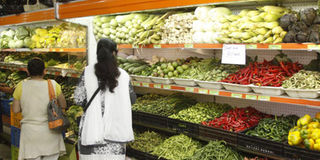Supermarkets beat open-air stalls in the race for customers

Kenya’s emerging retail market shows supermarkets are the most preferred outlets compared to village shops due to their wide varieties of goods and bargains. PHOTO | FILE
What you need to know:
- Looking at last year’s outlook, the report says Nakumatt Holdings Ltd maintained its leading position in grocery retailing with a market share of 8 per cent, closely followed by Tuskys supermarkets with 6 per cent.
- The report’s analysts observe that Kenya’s evolving grocery retailing has been leaning towards a mall culture where assorted items from household goods to fresh vegetables are found as well as a cafeteria fitted with technology for wireless cash transactions and internet access.
A just released five-year study on Kenya’s emerging retail market shows supermarkets are the most preferred outlets compared to village shops due to their wide varieties of goods and bargains.
Fast Market Research says modern grocery retailer market is expected to register a three per cent continued annual growth rate buoyed by improved infrastructure and a growing middle class that affords a wide variety of goods from packaged foodstuffs, electronics to new clothes.
“Modern grocery retailing is expected to outperform traditional grocery retailing. This will be driven by the continued development of the housing industry, increasing government investment in road infrastructure, the growing middle-class and increased urbanisation,” it says.
The report, however, says the trend does not mean immediate demise of traditional open-air markets for food and second-hand clothes.
“Unpackaged groceries will remain popular due to the existence of open-air markets and kiosks but the shift from unpackaged to packaged groceries is unstoppable due to the convenience offered by modern retail outlets and their competitive prices,” the report says.
“This change will be long-term as consumers continue seeking convenience, good quality and affordable products which modern grocery retailers have been able to provide at their doorstep.”
MALL CULTURE
Looking at last year’s outlook, the report says Nakumatt Holdings Ltd maintained its leading position in grocery retailing with a market share of 8 per cent, closely followed by Tuskys supermarkets with 6 per cent.
The two supermarkets, which opened their first stores in Nakuru as Nakuru Mattresses and Magic Super Stores respectively in early 1990s, have pursued an expansion strategy with a focus on the residential areas and along the highways.
The report’s analysts observe that Kenya’s evolving grocery retailing has been leaning towards a mall culture where assorted items from household goods to fresh vegetables are found as well as a cafeteria fitted with technology for wireless cash transactions and internet access.
“The growing mall culture in Kenya has promoted the rapid expansion of grocery retailing due to the increasing number of supermarkets and hypermarkets which currently account for 34 per cent of total grocery retail value sales and 20 per cent of overall retail value sales in 2014,” the report says.
The surveys adds that the mall culture is yet to gain momentum in rural areas but the trend is catching up with small retailers mimicking the bigger outlets where self-service shelves are now the norm.
“The independent small grocers are now mimicking bigger outlets in terms of product offering consumer shopping experience and packaging,” it says adding that Tuskys has recently partnered with Vivo Energy where Tuskys has taken over the running of Vivo’s key convenience stores at various petrol stations.
Fast Market Research mainly operates in Africa and the Middle East dealing in distribution of market research and business information aimed at enabling businesses establish an edge over the rivals via strategic decisions and locations.
The report looks at the two supermarkets as well as Uchumi Supermarket with the reports looking five years back.





